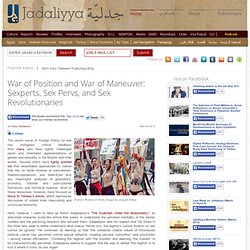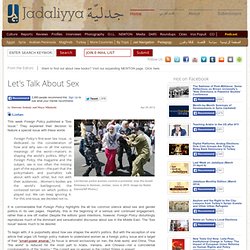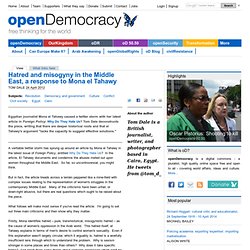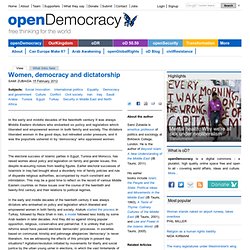

After the Arab Spring, the taboo on homosexuality remains by Brian Whitaker. When the European parliament issued a critical report on Egypt's human rights record in 2008, the Mubarak regime responded with nationalistic fury.

The Muslim Brotherhood, on the other hand, sided with Europe. "Respect of human rights is now a concern for all peoples," its parliamentary spokesman, Hussein Ibrahim, declared at the time. That Islamist movements, or at least the more mainstream ones, should take an interest in human rights is not especially surprising. They have, after all, experienced repression at first hand and had years to reflect upon it. There are some obvious limits, though. It's a similar story in Tunisia now where the moderately Islamist Ennahda party dominates the post-revolution government.
Dilou's remarks, though, confused and homophobic as they might seem, also suggest that Islamists -- some of them at least -- are beginning to shift their ground. Unintentionally, perhaps, Dilou's remarks also raised a tricky question for Tunisia's "distinctive" society. War of Position and War of Maneuver: Sexperts, Sex Pervs, and Sex Revolutionaries. The recent issue of Foreign Policy on sex has instigated critical feedback from many who have rightly challenged racist and Orientalist representations of gender and sexuality in the Muslim and Arab worlds.

Between You and Me. Let's Talk About Sex. This week Foreign Policy published a “Sex Issue.”

They explained their decision to feature a special issue with these words Foreign Policy's first-ever Sex Issue…is dedicated…to the consideration of how and why sex—in all the various meanings of the word—matters in shaping the world's politics. Why? Politics at the Tip of the Clitoris: Why, in Fact, Do They Hate Us? What baffles me most about Mona Eltahawy’s Foreign Policy article is that it does not accomplish the task it sets out for itself; it does not, in fact, answer its foundational question: Why do they hate us?

Hatred and misogyny in the Middle East, a response to Mona el Tahawy. A veritable twitter storm has sprung up around an article by Mona el Tahawy in the latest issue of Foreign Policy, entitled Why Do They Hate Us?

In the article, El Tahawy documents and condemns the abuses meted out upon women throughout the Middle East. So far, so uncontroversial, you might think. But in fact, the article treads across a terrain peppered like a mine-field with complex issues relating to the representation of women's struggles in the contemporary Middle East. Many of the criticisms have been unfair, or down-right abusive, but there are real questions which ought to be raised about the piece. What follows will make most sense if you've read the article. Why Do They Hate Us? - By Mona Eltahawy. In "Distant View of a Minaret," the late and much-neglected Egyptian writer Alifa Rifaat begins her short story with a woman so unmoved by sex with her husband that as he focuses solely on his pleasure, she notices a spider web she must sweep off the ceiling and has time to ruminate on her husband's repeated refusal to prolong intercourse until she too climaxes, "as though purposely to deprive her.

" Just as her husband denies her an orgasm, the call to prayer interrupts his, and the man leaves. After washing up, she loses herself in prayer -- so much more satisfying that she can't wait until the next prayer -- and looks out onto the street from her balcony. She interrupts her reverie to make coffee dutifully for her husband to drink after his nap. Taking it to their bedroom to pour it in front of him as he prefers, she notices he is dead.
She instructs their son to go and get a doctor. Yes: They hate us. But let's put aside what the United States does or doesn't do to women. Reuters. Women, democracy and dictatorship. The electoral success of Islamic parties in Egypt, Tunisia and Morocco, has raised worries about policy and legislation on family and gender issues, this despite re-assuring noises from leading figures.

Earlier electoral successes of Islamists in Iraq had brought about a disorderly mix of family policies and rule of disparate religious authorities, accompanied by much constraint and intimidation. This may be a good time to reflect on the record of various Middle Eastern countries on these issues over the course of the twentieth and twenty-first century and their relations to political regimes.
In the early and middle decades of the twentieth century it was always dictators who embarked on policy and legislation which liberated and empowered women in both family and society. Ataturk started the process in Turkey, followed by Reza Shah in Iran, a model followed less boldly by some Arab leaders in later decades. Flickr/Al Jazeera English. Demotix/Luke Somers. Demotix/Sabrina Belkhouja. Setbacks For Arab Women Have Outpaced Gains.
A protest leader gives directions to fellow protesters as they march during a demonstration in Sanaa May 10, 2012.

(photo by Reuters) Author: Barbara Slavin Posted May 15, 2012. How Not to Study Gender in the Middle East.